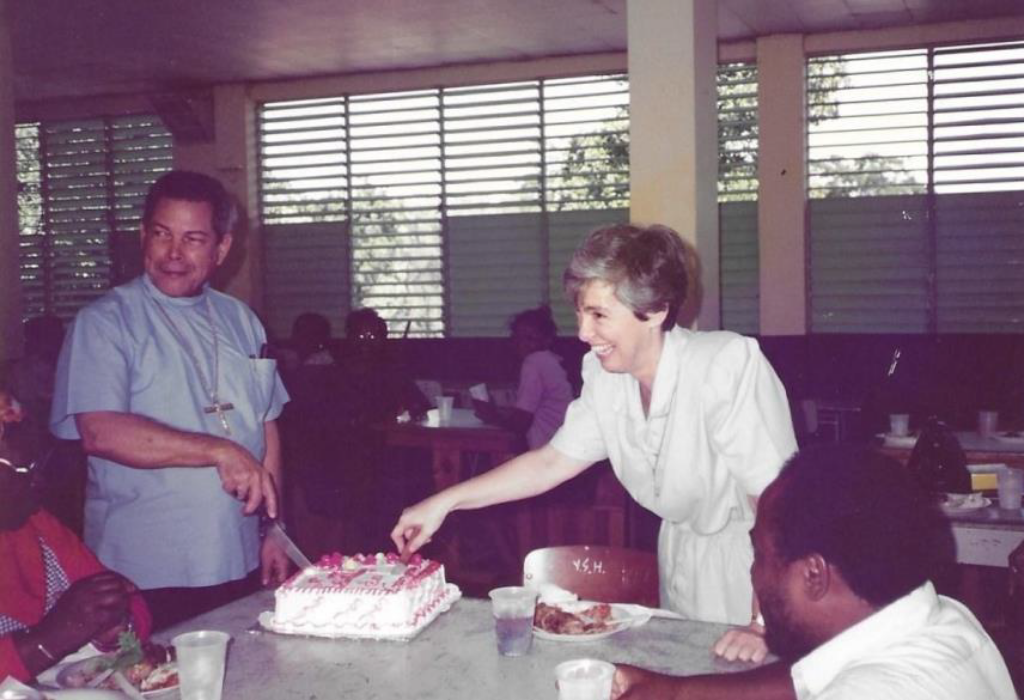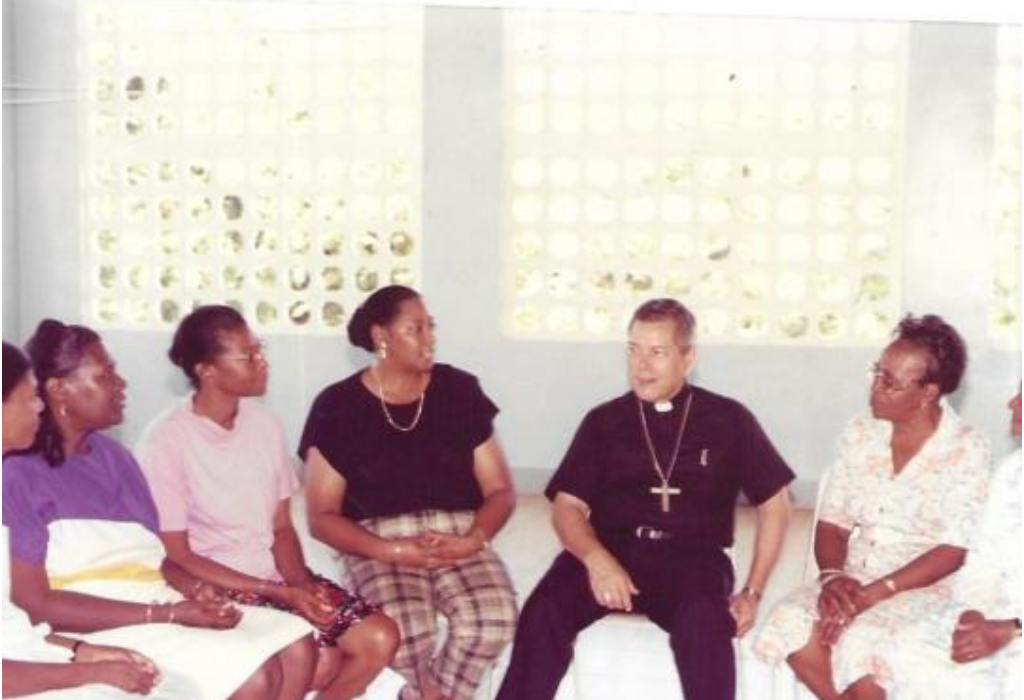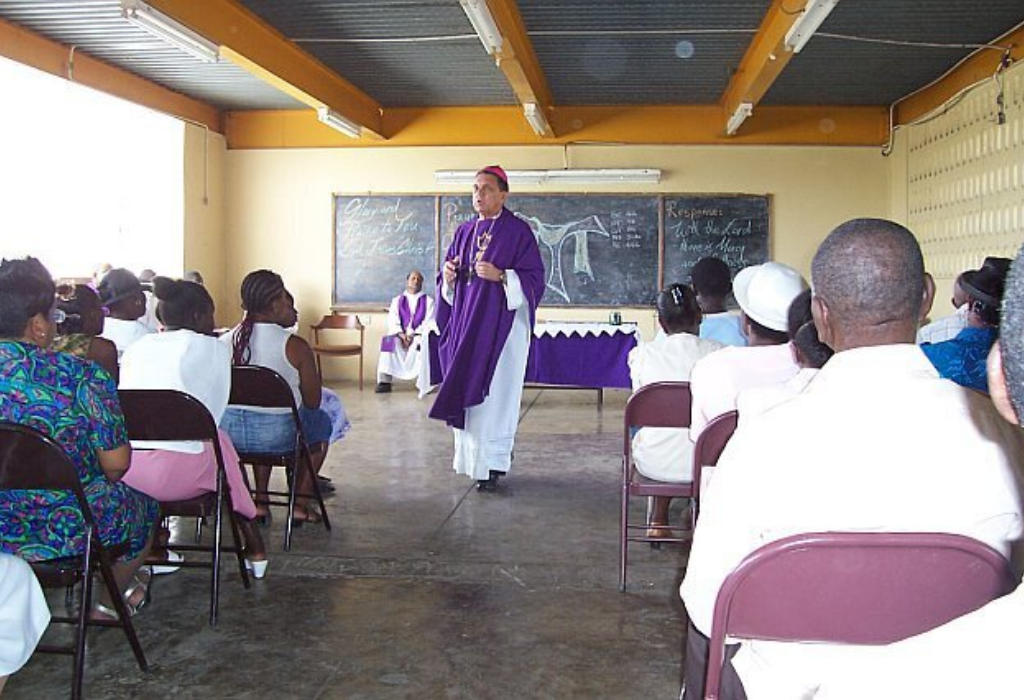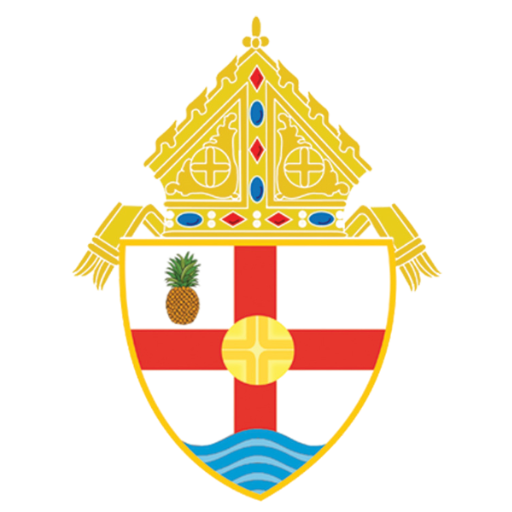Brief History of the Roman Catholic Diocese of Montego Bay
Between 1837 and 1957, the Catholic Churches in Jamaica were under the authority of a “Vicar Apostolic.” Beginning in 1957 and thereafter the Bishop of Kingston.
To adequately shepherd the Catholic population across the Island, the decision was made to create two Dioceses.
Rev. Edgerton Clarke was ordained bishop on November 30, 1967. He was installed in the Cathedral of the Blessed Sacrament in Montego Bay as the first Bishop of the Diocese of Montego Bay on December 8, 1967.
1967-1994

During his 27 years as bishop , Bishop Clarke shepherded a predominantly rural Church scattered over the 7 civic parishes in the western half of Jamaica (St. Ann, Trelawny, St. James, Hanover, Westmoreland, St. Elizabeth and Manchester). His mandate was to create and build up the new Diocese putting in place all the structures and programs necessary to develop the Diocese. This included recruiting and training catechists, liturgists, pastoral workers, administrators of various agencies and projects, the development of educational and health facilities. The Bishop’s residence and Chancery Office were located in the Rectory building until the present Chancery was built in 1987. Faced with the foreseeable prospect of very few priests as his collaborators, Bishop Clarke formed a Team comprising Sr. Georgeanne Marie Donovan (Marist Sister), Sr. Rose Chang (Servite Sister) and Fr. Gerry Reid to assist him in laying the foundation of formation of the laity.

Helping him during these years were Religious Order priests viz. Jesuits and Passionists, – (these were already ministering in the area before 1967) – while the Benedictines and Columbans came during the 1970’s 1980’s. A Diocesan priest from India (Augustine Mendoca) was incardinated into the Diocese while at least 2 other Diocesan priests were loaned from abroad. Rev. Ron Hamilton was the first Permanent Deacon to be ordained in the new Diocese. Apart from the Bishop himself, there were no local priests until 10 years later in 1977 when Fr. Gerard Reid became the first Jamaican to be ordained a priest for the Diocese. Concerned to build a bridge to potential local vocations to the Diocesan priesthood, Bishop Clarke established St. James Seminary in 1977. Thirteen years later Fr. Howard Campbell, a product of this Seminary, became the 2nd local priest ordained for the Diocese.
Also present in the area at the birth of the new Diocese were Religious Order Sisters viz. Mercy Sisters, Franciscan Sisters of Allegany, Dominican Sisters, Passionists Sisters, Franciscan Missionary Sisters (Blue Sisters), Marist Missionary Sisters, Servants of Mary (Servite Sisters) – all variously involved in education, health care and pastoral ministry.

A significant point of growth during these early years was the vision of Bishop Clarke to select and train lay men and women to collaborate with him and his priests in building the Diocese. This was the first Lay Leadership formation program which began in 1980. An important “spin-off” from this program was the strong community relationships which developed among the lay people across the Diocese. This sense of belonging to a Diocesan Church found genuine expression in the joy of coming together at the Cathedral for the annual Pentecost Pilgrimage, a special feature of the Montego Bay Diocese during the tenure of Bishop Clarke.
The first Diocesan Synod was held in 1984 – 1985 under the theme “Church: a Call to New Life”.
The 1970’s was a fertile period when the Diocese recognized the urgency of addressing the social needs of the Jamaican people; in the words of Bishop Clarke – “to give attention to the sacred regard that must be had for the dignity of the human person” (on the occasion of the 25th Anniversary of the Diocese).

In 1972 the Marist Sisters began the operation of a Self Help Centre in Mount Salem while in Seaford Town a Skills Training Centre and a Health Clinic were established through the efforts of Fr. Francis Friesen, OSB. These facilities continue today to serve the human development of Jamaicans.
In 1975, with the inspiration and zeal of Sr. William Margaret, OSF, the Hope Teaching Health Clinic was formally opened with the aim of offering wholistic health care to the poor and needy in Montego Bay and its environs. From its humble beginning in the Blessed Sacrament Church Hall, this Clinic has steadily grown into what is now a well-established health facility in the Diocese serving hundreds of patients each day.
In 1991 the size of the Diocese was reduced when the civic parishes of Manchester and St. Elizabeth were made a part of the third Diocese in Jamaica (Mandeville Diocese).
1996-2011

On June 10, 1996, Bishop Charles Dufour became the second Bishop of the Diocese, bringing his own special gifts.

- He developed the Permanent Deaconate, and at the end of his term there were 9 ordained permanent deacons in the Diocese.
- He recruited priests from different countries including the Franciscan Friars from the US, and Diocesan priests from Africa, the Philippines, the South Pacific, India, Pakistan, Poland.
- 2 new groups of Religious Sisters joined the Diocese – The Nigerian community of Daughters of Divine Love and the Filipino community of Compassionate Franciscan Sisters of the Poor.
- He established links with the Catholic Church overseas, viz the Diocese of San Jose in the U.S. by sharing in the Institute of Servant Ministries (ISM) and the Deacons Mission Partners (DMP) of that Diocese.
- The renewal program, Christ Renews His Parish (CRHP) was started in this Diocese and soon spread to the other Dioceses.
- In 2004 Fr. Carl Clarke was ordained the 3rd Jamaican priest for the Diocese.
- Bishop Dufour organized the Catholic schools under the first Vicariate of Education and set up a Diocesan Education Board to coordinate the educational institutions in the Diocese – 14 in total.

From its beginning, the Church of the Diocese would gather for meetings and Assemblies, and the second Diocesan Synod was held in 2003. This was carefully planned to cover 3 phases of renewal: preparatory participation at the local parish level, the Synod Assembly composed of delegates from each Church Community, and a 5-year program of personal and community renewal in which every child, youth and adult in the Diocese was expected to participate.
Bishop Dufour established the Good Shepherd Foundation and with it a hospice initially designed to minister to persons living with and dying from HIV-AIDS, but which now serves the sick and dying poor of the area.
On the occasion of the 40th anniversary of the Diocese, the Cathedral building was enhanced with the installation of stained glass windows depicting the life and ministry of Jesus.
On the ecumenical level, Bishop Dufour was actively involved in the Peace Management Initiative (PMI) and the St. James Ministers’ Fraternal.
The Diocese moved into the technological age with the setting up of Live Streaming in 2015 – thus enabling people across the world to view liturgies and celebrations in the Cathedral.
2013-2020

Bishop Burchell McPherson was installed the 3rd Bishop of Montego Bay on June 8, 2013 – two years after Bishop Charles Dufour was transferred to become the Archbishop of Kingston.
In 2016, Fr. Philip McKenzie was ordained the 4th Jamaican priest for the Diocese, and in 2017, Fr James Saturday and Fr Moris Achid, natives of Uganda, were also ordained for this Diocese.

Two new Communities of Religious Sisters joined the Diocese during this period: the Little Sisters of the Immaculate Conception (from Poland) who directed a basic school in Cambridge, and the Kkottongnae Sisters of Jesus (from South Korea) performing street ministry among the poor of Montego Bay.
The Cursillo Movement was reactivated in the Diocese in 2013.
Bishop Burchell’s concern for the Youth resulted in annual events – Youth Rally and Sports Day both of which generate much energy and excitement in the Diocese.
Increased partnership with Food for the Poor strengthened the Church’s social outreach in the Diocese.

The small rural Church Community of St. John Berchman in Pisgah in the civic parish of St. Elizabeth, returned to the Montego Bay Diocese for the practical reason of geographic proximity and ease of administration.
“Reflections on the Unfolding Purpose and Will of God for the Church” is the title Bishop Clarke gave the article he wrote for the commemorative magazine for the 25th Anniversary of the Diocese.
God’s purpose continues to unfold in the Church of the Montego Bay Diocese. This unfolds through the Bishops and Apostolic Administrators who lead and guide God’s people into a deeper understanding and expression of the Church as a Eucharistic Community of faith and action, carrying out the mission of Jesus Christ in the Jamaican society of today by being light in the darkness of our broken society and salt in the lives of people desperately seeking wholeness and meaning.
